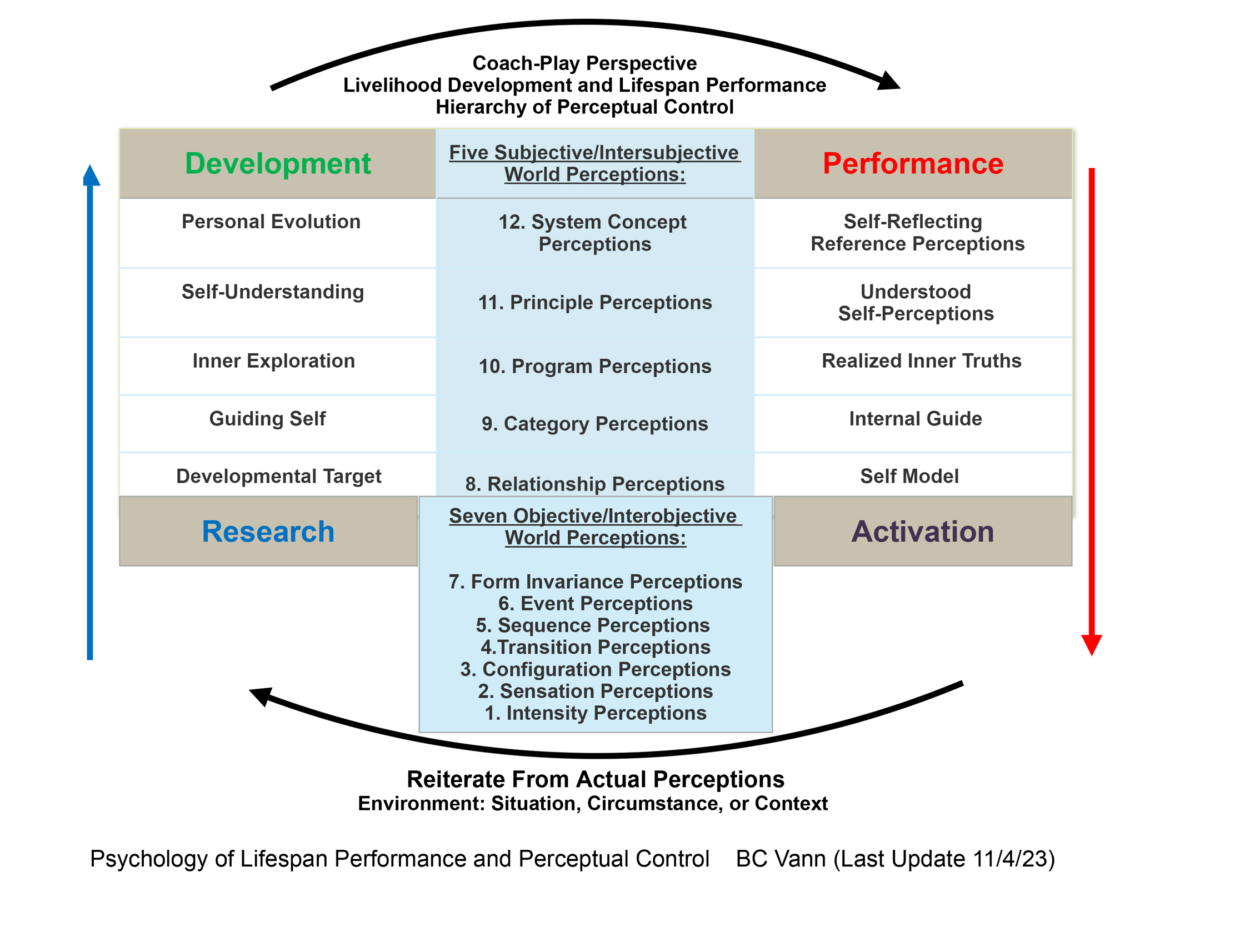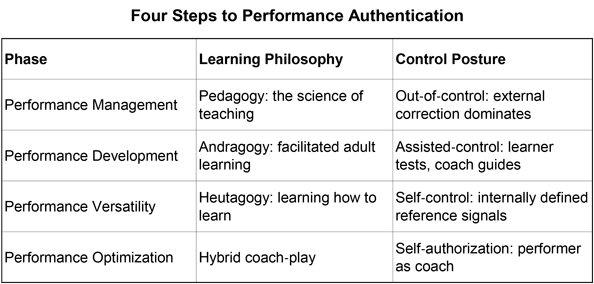As Your Resource For Self-Development
- The Optima Bowling Coach (2025)
The Evolution of Coaching
(Page Updated 4/26/25)
Coaching has always been an attempt to initiate latent capacity toward visible accomplishment. For centuries, the effort relied on the command and control technique: the expert coach prescribed behavior, the compliant performer obeyed, and success was measured by outward conformity. Yet humanity’s deeper narrative, the restless dance between potentiality and actuality, was only partially served by that model. We find potentiality names vast, unexpressed resources encoded in every person. Actuality is those resources activated through purposeful practice.
Contemporary cognitive science, perceptual control theory, and systems thinking now combine to reveal why old methods were bound to give way. Optima Bowling today captures the shift from the expert authoritarian to hybrid self-research for self-development, from isolated drills to integrated systems, from fragmented skills to wholeness. Here, we trace that ascent, situating the coaching evolution story in the broader framework that now includes the LPPC model of Lifespan Performance and Perceptual Control, the PIE (Purpose, Integrity, Experience) coach play perspective, the Four Steps to Performance Authentication, the systemic levels of being, and the hybridization of ideological streams.
Historical and Ideological Journey
Historically, traditional coaching was dominated by hierarchical relationships, characterized by coaches who exercised authority and expertise to command obedience and discipline. This rigid, authoritarian framework reached its apex in the mid-20th century, reflecting broader societal patterns emphasizing control, conformity, and standardized behaviors. Coaches were seen as authoritarian figures, exerting dominance through punishment and regimental drills designed to mold athletes into predetermined roles, often at the expense of their personal well-being and long-term growth.
However, significant cultural and societal shifts during the 1960s introduced alternative ideologies into the coaching world. Influenced by broader movements toward dialogue and democratic interaction, many coaches began adopting more collaborative, relationship-oriented methodologies. This shift gradually challenged mainstream authoritarian norms, opening the door for deeper explorations of human potential and personal development.
By the late 20th century, empowerment-based coaching models emerged, greatly influenced by humanistic and positive psychology. Thought leaders like Tim Gallwey championed methods emphasizing self-awareness, intrinsic motivation, and psychological well-being. These frameworks elevated athletes from passive receivers of instruction to active, reflective participants in their development.
Today, the evolutionary approach of the Optima Bowling ideology embraces a hybrid coach-play perspective deeply anchored in the synthesis of past insights, mainstream practices, and future innovations. This contemporary hybrid model redefines the coach-athlete relationship as a dynamic, dialogic partnership to facilitate self-authorized, lifelong development. The coach is now seen as a facilitator who guides self-discovery, supporting athletes and learners as they transition from passive compliance to active, self-directed engagement with their potential and actualized performance.
Coaching Evolution charts the field’s migration from authoritarian instruction to empowered dialogue. As seen through a systems-of-systems lens, coaching history looks less like a linear timeline and more like oscillations in who holds the reference signals.
- Authoritarian Era: Coach owns purpose, integrity, and experience; LPPC loops run blindly on borrowed settings.
- Transitional Era (1960s‑1980s): Dialogue experiments begin; performers test personal reference points but still lean on external evaluation.
- Empowerment Era (1990s‑2000s): Intrinsic motivation gains prestige; however, fragmentation persists because systemic models are lacking.
- Hybrid Coach‑Play Era (Current): Systems thinking, cognitive science, and self‑research converge. Reference signals become transparent artifacts that the coach and player edit collaboratively; performance becomes an iterative scientific practice.
The observations about andragogy, positive psychology, and self‑authorization stand, but they now slot into the four‑step performance authentication staircase and are stabilized by the deeper architecture of the LPPC model.

The LPPC Model: a Neuro‑Cognitive Backbone
The Psychology of Lifespan Performance and Perceptual Control (LPPC) model supplies a scaffold for everything that follows. Twelve nested levels of perception, ranging from raw sensory intensities to abstract system concepts, explain how an action is nothing more (and nothing less) than the control of perception. Lower loops manage speed and timing; middle loops choreograph sequences; upper loops set program rules, principles, and worldviews. Traditional coaching worked almost exclusively at levels one through six: it drilled motor patterns, corrected errors, and hoped that higher‑level insights would percolate upward. The LPPC model reverses the logic, demonstrating that durable performance control and change begins with upper‑level reference signals propagating downward until physical expression becomes inevitable. Every modern coaching advance, from video feedback to player analytics, can be read as an attempt to shorten error‑detection delays within these loops, giving performers the information they need to realign perception and action in real-time.
PIE Coach‑Play Perspective: Purpose, Integrity, Experience
Within the LPPC scaffold, Optima Bowling places the PIE Coach‑Play Perspective, a systemic re‑imagining of teacher and learner roles. Purpose clarifies why effort matters; Integrity integrates the physical, emotional, mental, and causal dimensions so that no layer of being sabotages the others; Experience grounds abstract intent in concrete iterations. In traditional regimes, the coach supplied purpose, enforced integrity through discipline, and orchestrated experience through rigid schedules. The PIE perspective decentralizes authority: teacher and student trade places in a dynamic feedback dance. Purpose becomes co‑created, integrity becomes self‑monitored, and experience becomes a jointly curated rehearsal space. The result is a living bridge between potentiality and actuality, which is less a corridor of command and more a circulatory system of mutual perception.

Four Steps to Performance Authentication: a Developmental Staircase
The movement from external control to self‑authorization unfolds in four recognizable phases, each associated with a learning philosophy and a dominant control posture.
Anchoring this progression to the LPPC hierarchy clarifies why progress sometimes stalls: maybe transition-level perceptions are weak, category-level labels are fuzzy, or principle-level conflicts remain unresolved. The four steps, therefore, act as transdiagnostic lenses: determine the phase, locate the perceptual bottleneck, and intervene precisely.
Systemic Levels of Being Human
Coaching evolution cannot ignore the complex substrate it serves. Optima Bowling recognizes three interwoven strata of being human:
- Physical Organism-Etheric: biomechanics, energy systems, circadian rhythms.
- Emotional Repulsive-Attractive: affective states that push us away from threats and pull us toward opportunity.
- Mental–Causal: Conceptual to perspective reasoning and the deeper intentional field from which values and purposes emanate.
Early coaching models dealt almost exclusively with the physical stratum. Later empowerment models addressed emotion, but often as a motivational afterthought. The latest iteration (optima coaching) insists on causal alignment: physical drills, emotional climates, and mental constructs must serve a single-pointed, transparent intention, or performance authenticity will fracture under stress.
Hybridization of Ideological Streams
Any robust coaching philosophy must situate itself historically. Optima Bowling identifies three streams whose confluence generates today’s best practice:
- Past‑Stream: ancient wisdom traditions, Pythagorean hylozoics, early guild apprenticeship.
- Mainstream: 20th‑century sports science, behavioral psychology, empowerment coaching of the 1990s.
- Future‑Stream: systems theory, perceptual control modeling, AI‑assisted feedback, lifespan self‑research.
The hybrid coach‑play perspective distills lessons from each stream: the Past teaches virtue, the Mainstream teaches an evidence‑based method, and the Future teaches adaptive self‑calibration. Recognizing the streams immunizes practitioners against chronological snobbery, either the reflex to dismiss old wisdom or the temptation to worship novelty.
Integrating Fragmentation and Wholeness
Fragmentation is the persistent enemy of potentiality. When body, emotion, and intention drift out of alignment, the feedback loops of LPPC generate chronic error signals that feel like fatigue, anxiety, or doubt. Historical coaching often fought fragmentation with stricter regimes, which only relocated stress. Optima Bowling pursues the opposite: identify the junction where perception splits, then reunite it by clarifying reference values. The reward is wholeness, where energy, once spent on internal conflict, can be redirected toward creative exploration. In practical terms, wholeness means fewer injuries, faster skill acquisition, and a subjective sense of meaningful engagement—markers of actuality realized.
Cross‑Industry Implications
Optima Bowling’s systems‑of‑systems approach extends beyond the alley.
- Education: Teachers pivot from content deliverers to loop designers, training students to set, test, and revise their reference signals.
- Coaching: Practitioners in any sport or art adopt diagnostic hierarchies, replacing one‑size‑fits‑all drills with perception‑level interventions.
- Self‑Help: Individuals learn a portable algorithm: sense error, trace hierarchy, adjust reference, rehearse until automatic, and reflect philosophically.
Across all three industries, the metrics shift from raw output (scores, grades, income) to lifecycle coherence and harmony between potentiality and actuality, which are measured over decades, not seasons.
Future Directions
Three research agendas emerge:
- Neuro‑feedback mapping: Correlating LPPC levels with brain‑network signatures to automate bottleneck diagnosis.
- AI‑mediated coaching dialogues: Conversational agents that track verbal and kinesthetic cues to suggest next‑level reference adjustments.
- Longitudinal wholeness metrics: Composite indices that integrate physical health, emotional variability, mental flexibility, and causal clarity.
These projects promise to refine the coaching craft while preserving the humanistic spirit that sparked the evolution in the first place.
See More: The Future of Coaching
A Living Discipline
The Optima Coaching ideology introduces a maturation from a monologue of commands into a dialogue of perceptions. Optima Bowling: Potentiality and Actuality situates that dialogue inside a comprehensive systems architecture where LPPC supplies the control loops, PIE frames the motivational triad, the Four Steps chart developmental progression, the systemic levels of being honor human complexity, and the hybridized ideological streams keep practice historically literate and futuristically agile. Under this canopy, potentiality is no longer an airy metaphor; it is a measurable reservoir, accessible through deliberate self‑research and socially supported feedback. Actuality, likewise, ceases to be a temporary peak and becomes an evolving expression, a signature pattern of harmonious control that adapts as one’s world expands. Thus, the evolution of coaching is not merely a chronicle of changing techniques but an unfolding revelation of what it means to be an integrated human being, shaping worlds rather than ignoring them and inviting others to do the same.
Coaching Evolution Worldview
Central to understanding the contemporary coaching evolution movement is the integration of the Hylozoic worldview, an ancient philosophical tradition attributed to Pythagoras that emphasizes that all matter is intrinsically conscious and interconnected. The Hylozoic worldview proposes that reality consists of three inseparable aspects: matter, consciousness, and motion-energy-will, suggesting that everything within the cosmos actively participates in a shared, single-pointed purposefulness, evolving consciousness.
See More: Coaching Evolution World View
Practical Coaching Evolution
Practical coaching evolution moves beyond theoretical frameworks to embody concrete practices designed to transform potentialty into actuality. Central to this practical dimension is the concept of lifespan performance, representing the systematic management and intentional activation of personal growth across one's lifespan. To implement this effectively, coaching evolution incorporates perceptual control theory (PCT), the active regulation of perceptions rather than passive responses to external stimuli, and the most distinctive function within the Psychology of Lifespan Performance and Perceptual Control (the LPPC model).
Coaching Evolution Content
The Optima Coaching Evolution content operationalizes philosophical and practical principles into clearly actionable methodologies, bridging latent human potential with tangible, real-time performance activations. The content is a coherent, hybridized model facilitating continuous self-development and performance enhancement, contingent on synthesizing the three ideological streams identified by Optima Bowling as Past-stream, Mainstream, and Future-stream.
In Total
This study of the evolution of coaching helped to frame the Optima Bowling ideology that now provides a rich and integrative model to systematically synthesize historical wisdom, contemporary practices, and future innovations to guide individuals and societies toward realizing human potential, facilitating an evolving dialogue between potentiality and actuality, through purposeful reflective practice and self-initiated self-intentions across the systemic levels of being human. The Optima Bowling aspiration of holistic human development, sustained self-awareness, and meaningful performance enhancements is our future-stream today.
See Next: Perceptions: A Deep Analysis
See More: Beyond Ordinary Coaching
See More: Optima Bowling Academy
Back To: Back to the Begining of OB.com